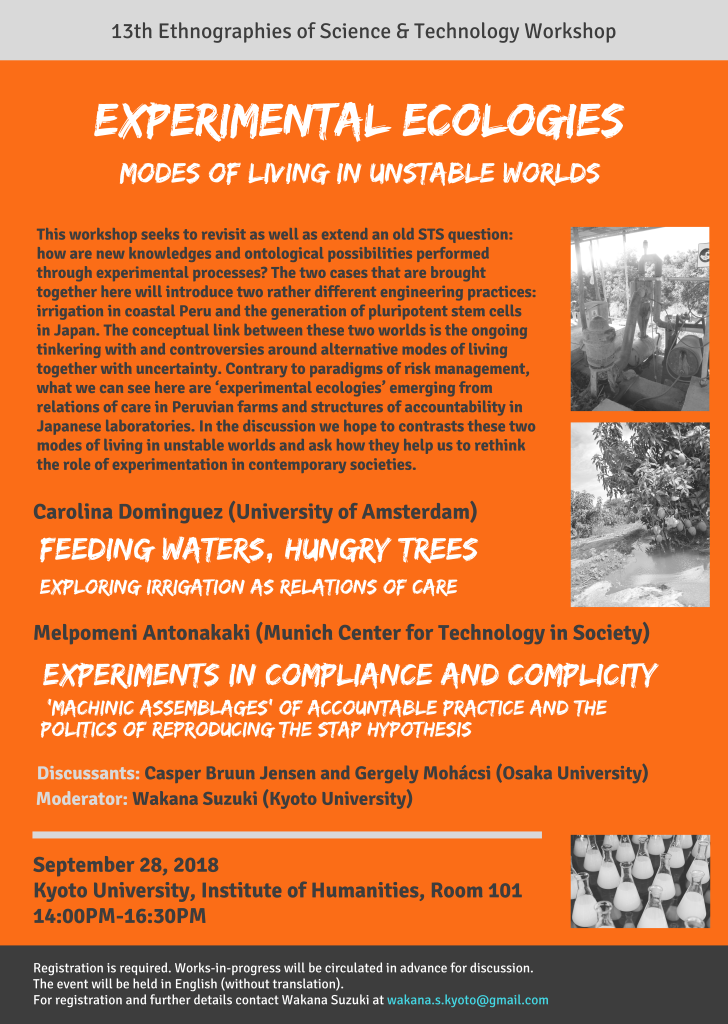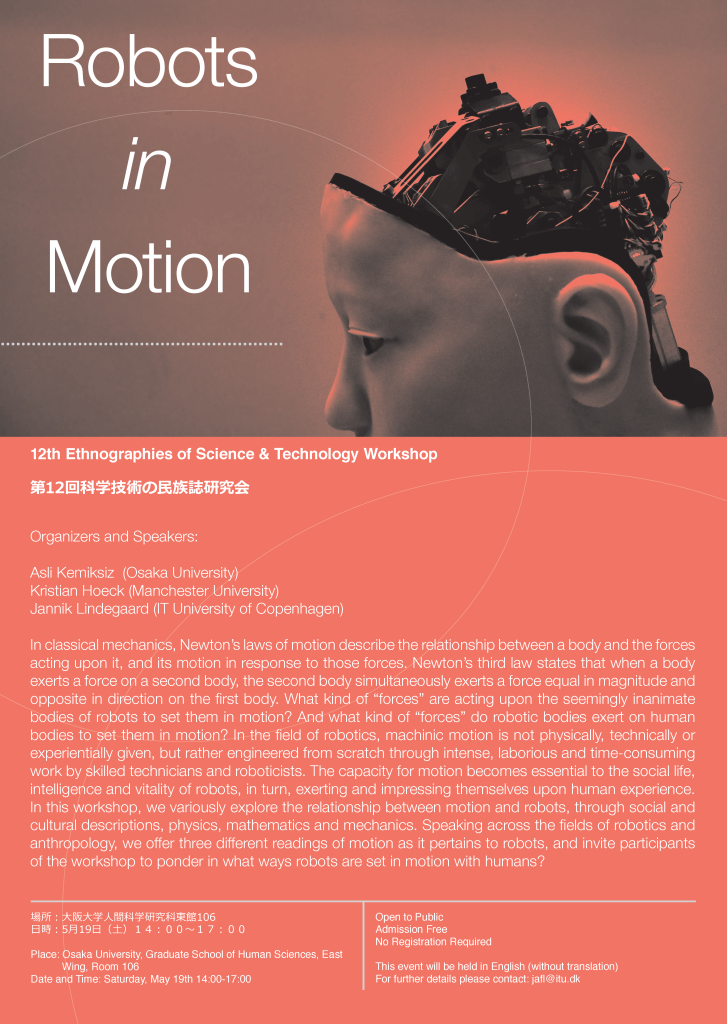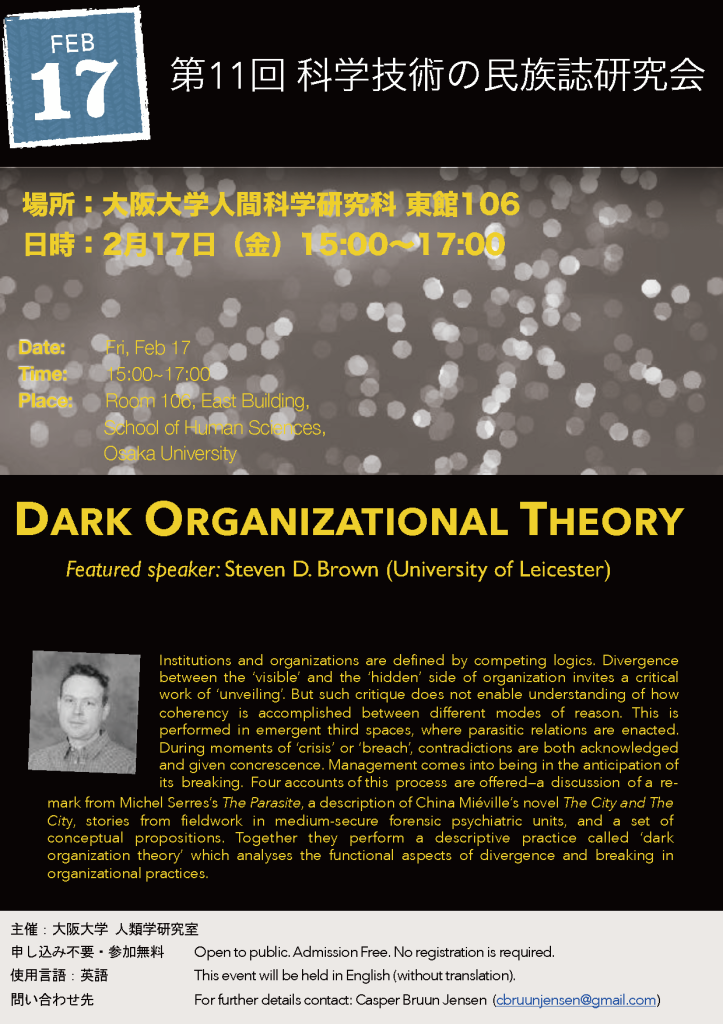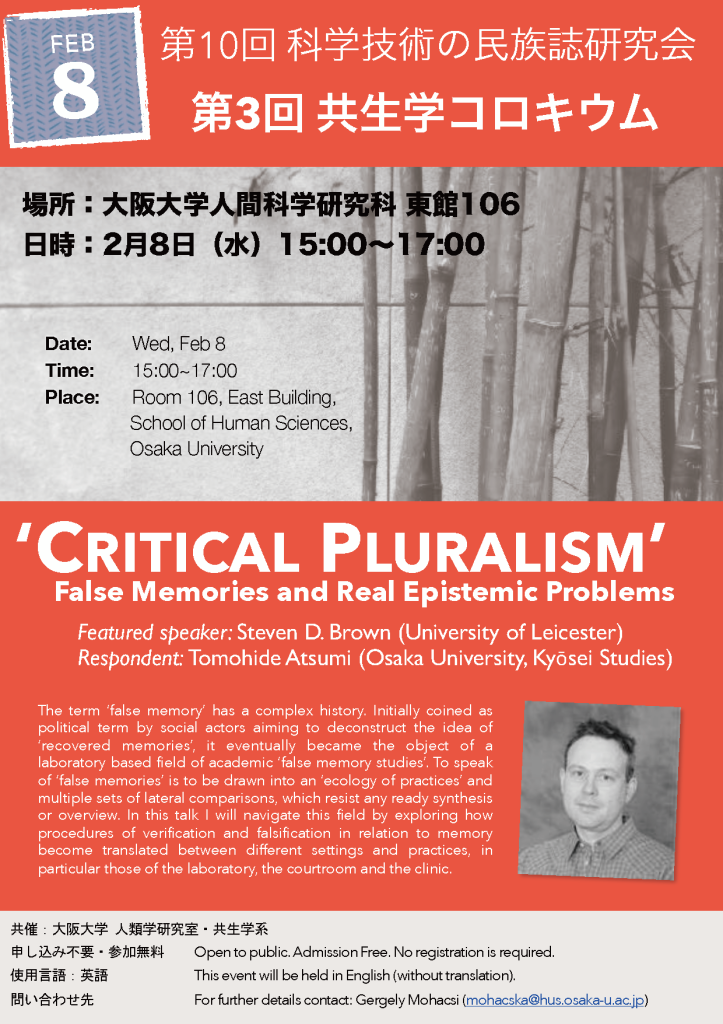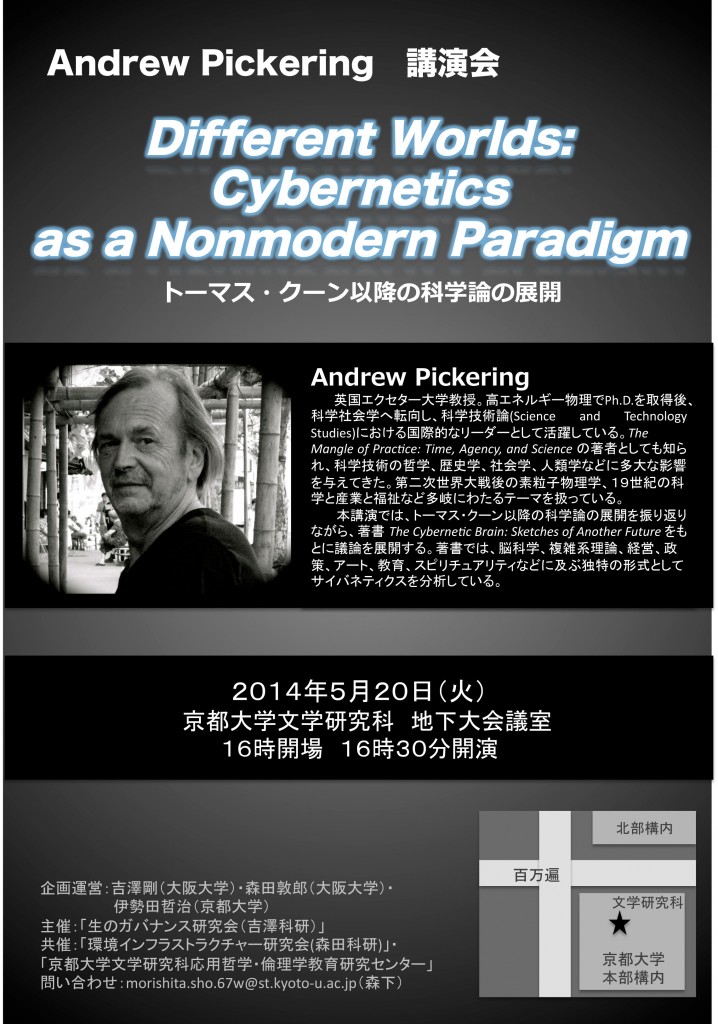Category Archives: EVENTS
12th Workshop
11th Workshop
10th Workshop
9th Workshop
9th Ethnographies of Science & Technology Workshop
.
New Ontologies?
Some recent turns to ontology and their implications for anthropology
Lecture & discussion
Continue reading
8th Workshop
8th Ethnographies of Science & Technology Workshop
DIFFERENT WORLDS
Cybernetics as a Nonmodern Paradigm
Andrew Pickering
(University of Exeter)

.
Date and Time: Tuesday, May 20, 16:30-18:00
Venue: Basement Lecture Hall, Faculty of Letters Main Bldg, Kyoto University
Access: http://www.bun.kyoto-u.ac.jp/en/about/access
.
.
7th Workshop
.
7th Ethnographies of Science & Technology Workshop
EXPERIMENTAL SYSTEMS AND INTERSECTIONS OF KNOWLEDGE
A Dialogue between Hans-Jörg Rheinberger and Japanese Anthropology
3rd symposium
ACTING WITH NONHUMAN ENTITIES
Posthumanist Explorations between Anthropology and Science Studies
International Conference and Workshop at Kyoto University
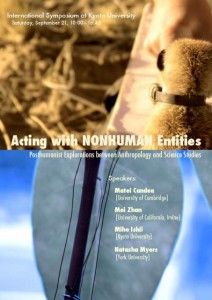 Date: March 3-4, 2012 (Saturday and Sunday)
Date: March 3-4, 2012 (Saturday and Sunday)
Venue: Kyoto University, Institute for Research in Humanities (Main Bldg., Conference Room)
access map: http://www.zinbun.kyoto-u.ac.jp/e/institute/access-institute/access_e.htm
Open to public. Admission Free. No registration is required.
SYMPOSIUM ABSTRACT
Whereas artifacts, animals and all sorts of otherworldly creatures have long occupied the attention of anthropologists, recent encounters with science and technology studies have stimulated a novel interest in ecological thinking. Part of the impetus for this research comes from a shared critical stance towards the anthropocentric bias of social research. Another important issue central to these debates has been a growing emphasis on innovation at the ethnographic level. Posthumanist approaches call for a closer attention to nonhuman entities by exploring their role in what constitutes the senses, persons, worlds, etc. This conference will reflect on these conceptual and methodological currents in anthropology and beyond with the participation of scholars from diverse backgrounds and fields of study. Some of the key concerns and question we shall focus on are: What disciplinary boundaries have to be crossed or permeated to reveal otherwise unattended links between human and nonhuman ways of acting in the world? What are the distinguishing features of these analytic experimentations when compared to earlier work in ecological and cultural anthropology? How do the variety of posthumanist trends, from actor-network theory to multispecies ethnography and ontological anthropology, differ from and relate to each other? We hope to address these questions by both discussing new theoretical challenges and presenting diverse ethnographic cases relevant to the ongoing transformations of the world—a world, which is populated with humans and animate non-humans alongside techniques, and anthropologists who try to understand them.
PARTICIPANTS
Guest Speakers
Matei Candea (University of Cambridge)
Miho Ishii (Kyoto University)
Natasha Myers (York University)
Mei Zhan (University of California, Irvine)
Workshop Presenters
Moe Nakazora (JSPS/Kyoto University)
Lea Schick (IT University, Copenhagen)
Wakana Suzuki (Osaka University)
PROGRAM
Day 1 (Graduate Workshop)
13:30 Introduction
13:45 The Care of the Cells: Body, Care and Affect
Wakana Suzuki (Osaka University)
Comments by Natasha Myers (York University)
14:45 (Coffee Break)
14:55 Infrastructuring Smart Grid Environments: Technological Artifacts, Subjectpositions and ‘Natures’
Lea Schick (IT University, Copenhagen)
Comments by Mei Zhan (University of California, Irvine)
15:55 (Coffee Break)
16:05 Pure Gifts for Future Benefit? Giving Form to Subject in the Biodiversity Databasing Project in India
Moe Nakazora (JSPS/Kyoto University)
Comments by Matei Candea (University of Cambridge)
17:15 Closing comments by Paul Hansen (Tsukuba University)
Day 2 (International Symposium)
10:00 Moderator/Introductory Remarks by Gergely Mohácsi (Osaka University)
10:15 Excitable Tissues: Vocalities and Temporalities in Botanical Experiments
Natasha Myers (York University)
11:15 (Coffee Break)
11:30 Disharmony Undivided: Thinking, Doing and Being Posthuman through Daosim’
Mei Zhan (University of California, Irvine)
12:30 (Lunch Break)
13:30 The Ecology of Transaction: Dividual Persons, Spirits, and Machinery in the Special Economic Zone in South India
Miho Ishii (Kyoto University)
14:30 Not feeding (or eating) meerkats
Matei Candea (University of Cambridge)
15:30 (Coffee Break)
15:45 General Discussion
For further details contact:
Atsuro Morita (Osaka University) morita@hus.osaka-u.ac.jp, or
Gergely Mohacsi (Keio University) mohacska@z3.keio.jp
6th workshop
6th Ethnographies of Science & Technology Workshop
第六回「科学技術の民族誌研究会」
At the Crossroads of Medical and Cultural Anthropology
– Culture, Medicine, Comparison –
文化と医療研究からみた現代人類学における『比較』の方法と実践
Date and Time: August 29, 2012, 15:00~18:00
Venue: G-sec Lab, 6F, East Building, Mita Campus, Keio University
Access: http://www.keio.ac.jp/access.html
Open to public. Admission Free. No registration is required.
This event will be held in English; summary in Japanese is provided after each talk.
For further details contact: Gergely Mohacsi (mohacska@z3.keio.jp)
PROGRAM
15:00 Introductory Remarks
Gergely Mohacsi (CARLS, Keio University)
15:15 Beyond the Horizon: An Inquiry into the Outermost Reaches of the
Anthropological Gaze and the Comparative Method
Allan Young (McGill University)
16:15 (Coffee Break)
16:30 Roundtable Discussion
Coordinator: Gergely Mohácsi (Keio University)
Participants:
Allan Young (McGill University)
Pino Schirippa (University of Rome)
Kitanaka Junko (Keio University)
Yamazaki Goro (Osaka University)
Hamada Akinori (JSPS)
17:30 General Discussion
Coordinator: Miyasaka Keizo (Keio University)
MOTION & ABSTRACT
The suggested motion for the roundtable discussion is:
Medical anthropology illuminates the recursive relationship between the anthropological tool of comparison and human differences.
Physicians and other medical professionals—not to mention patients—are only very rarely interested in the debates of medical anthropologists. One reason for this is that medical anthropology will never be able to cure people; one field, however, where medical anthropologists can contribute is (cultural) anthropology. Comparison is one issue/method where such a contribution is possible. It used to be the ultimate method in anthropology, but for a long time it is rather a target of criticism than anything else. Medical anthropologists, however, can provide many examples of how people—patients, physicians, epidemiologists, brain scientists, etc.—actually do comparisons all the time. We should rethink comparison as both a method and a daily practice (in medicine, and else) that links ethnography and anthropology. Whatever we think about its correctness or validity, comparison is one way people do their cultures, their religions, their sciences, their ethnicities, their gender, etc. It is therefore a very good example how anthropologists do exactly what their informants do—but it is very rarely admitted (despite the many other examples for such a recursive relationship in anthropology. The argument here is that admitting this relationship between the method and subject of ethnography may lead to new innovations in anthropological theory and practice, and that medical anthropology has a pivotal role there.
5th workshop
5th Ethnographies of Science & Technology Workshop
第五回「科学技術の民族誌研究会」
「存在論的転換」を再考する
Casper Bruun Jensen
(IT University of Copenhagen)
【日時】2012年5月7日(月)14時〜17時
【場所】大阪大学人間科学研究科(吹田キャンパス)2階 会議室B
アクセス:https://55099zzwd.coop.osaka-u.ac.jp/daigaku-hall/files/access.html
問い合わせ先:鈴木 和歌奈(wakana.s.kyoto@gmail.com)。
※ テキストについてはこちらから入手ください。
導入
「存在論的転換」という言葉が、昨今日本でも多くの人類学者の口に上るようになってきました。しかしながら、この言葉が何をさしているのかは必ずしも明白ではありません。たとえば、科学技術を研究する人類学者たちは、自然についての科学的事実が科学の実践を通して立ち現れるというSTSの議論に依拠して、知識についての人類学的研究をモノの自然的/技術的構成も含んだものに拡張することを主張してきました。一方、Viveiros de Castroらの影響を受けた人々は、存在論を世界認識のあり方の根源的な他者性をとらえる方法として主張しています。さらに、こうした議論は、Roy WagnerからMarilyn Strathernに至る民族誌的な実践のイノベーションと絡み合ってきました。そのため、現在、存在論をめぐる議論はある種の混乱状態にあるように思われます。今回の研究会では、存在論をめぐってデンマーク人類学会で戦わされた論争のコメンタリーとして、Christopher Gad, Casper Jensen, Brit Ross Winthereikが共著した論文を取り上げます。この論文で著者たちは、STSと人類学の異同に注目しながら、存在論をめぐる議論の状況の整理を試みています。当日は、著者の一人であるCasper Jensenさんとともにこの問題を考えたいと思います。なお、当日はテキストを読んでくることを参加の条件とさせていただきます。
検討テキスト:
Christopher Gad, Casper Bruun Jensen & Brit Ross Winthereik (manuscript) “Practical Ontology: Worlds in STS and Anthropology” (English translation of the original Danish text appeared in “Tidsskriftet Antropologi” in 2012).
